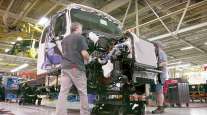DTNA Backs US GHG Rule, Connected Vehicles

The continent’s largest heavy-duty truck maker also said at an Oct. 3 press event here that truck sales might not reignite until the second half of 2017 and that while connected vehicles are important for maintenance efficiency, a vehicle-to-vehicle system is still far off.
Finally, DTNA President Martin Daum said he will take in stride the competition from his old boss, Volkswagen Truck & Bus head Andreas Renschler, who will soon be affiliated with Navistar International Corp. when VW completes its purchase of 16.6% of the domestic truck maker.
Daum, who grades his remarks from the previous year at this annual event, said, “We were much more optimistic for 2016 last year.” He said first-half sales for next year should be fairly steady with this year’s levels, but the second half of next year and 2018 should be better.
Until that growth happens, he said he is very pleased with the launch of the new Cascadia and a market share of about 40% of Classes 6-8 in North America.
His remarks coincided with the Management Conference & Exhibition of American Trucking Associations here.
Daum said the GHG rule is “tough . . . but we’re confident we’ll make it.”
Sean Waters, DTNA’s director of product compliance and regulatory affairs, said the GHG rule will provide engineering challenges for Class 8 highway tractors, vocational vehicles and the company’s Detroit brand engines, but there is also a lot of time to get to the most stringent carbon dioxide standards that take effect in 2027.
Phase 2 was jointly authored by the Environmental Protection Agency and the National Highway Traffic Safety Administration to reduce carbon dioxide and other GHG emissions from heavy- and medium-duty trucks.
Asked about the competition with Renschler, Daum said, “We take every single competitor seriously — regardless of whether he is a former boss. We never underestimate a competitor — or overestimate one.”
Renschler was head of Daimler Trucks through March 2013, when he was succeeded by Wolfgang Bernhard, who is still in charge of the global division.
On connected vehicles, Daum said it would be “perfect” if all cars, trucks and buses used vehicle-to-vehicle technology but that is difficult and unlikely anytime soon. Asked if 80% connectivity would be sufficient, he said it would not.
Also at the event, DTNA announced relationships with AT&T and Microsoft.
AT&T will provide connectivity for the new Detroit Connect Truck Data Center platform, while Microsoft will support all Detroit Connect services with the Microsoft Azure cloud platform.
Detroit Connect is the company’s suite of connected vehicle services.




